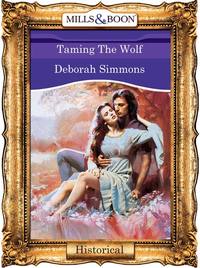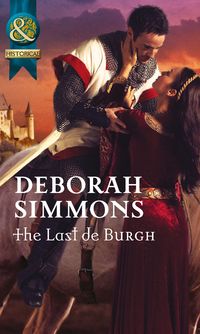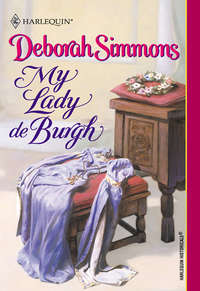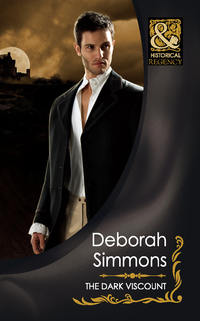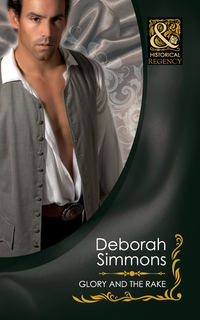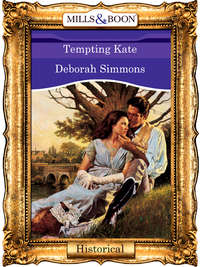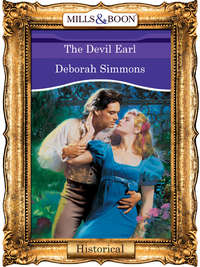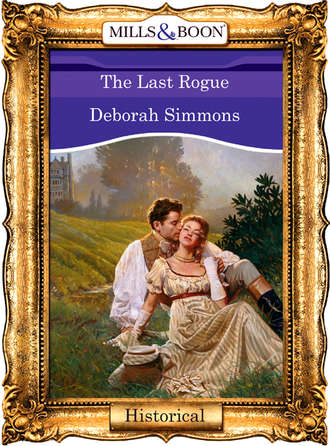
Полная версия
The Last Rogue
Jane swallowed harder as she tried to reconcile these haughty creatures with her own warm family. Even Wycliffe’s mother, although rather frivolous, was friendly in her own sort of way. But these two were positively forbidding. Neither had stepped forward to welcome their son, but presided over the salon like a pair of solemnfaced icons.
“As you say, Father. I vow I will never ill-use the servants again, but Pridham was right. May I present my wife, formerly Miss Trowbridge, now Viscountess Raleigh.” So far Raleigh’s parents had apparently deemed Jane unworthy of their continued regard, and belatedly she realized her good fortune, for when their heads turned her way in stilted horror, it was all she could do not to squirm beneath their sharp scrutiny.
“Surely you jest,” the countess said, looking Jane up and down as if she were no more than a passing peasant.
“Trowbridge? Can’t say I recall the name,” said the earl in puzzled accents.
“I doubt if you would know it, sir,” Raleigh said. To Jane’s surprise, he crossed the room to stop behind her chair. She felt the heat from his hands as they settled on the edge at her back, though she did not know if he had come to offer comfort or restrain her, should she ignore his advice. Truth be told, she was already tempted, for how could one nod and smile under the force of such contempt?
“Her sister is Countess Wycliffe,” Raleigh said.
“Wycliffe? But I thought he married a beauty, some vicar’s daughter,” the earl said. Staring incredulously at Jane, he made it clear that he could not believe she was related to anyone possessing a pleasing countenance. Jane recognized the look and despised it. It ignited a slow-burning anger in her breast, one her father would not approve of, but fueled with the heat of past hurts.
“Deverell! You cannot mean it!” The countess choked, glancing from her son to Jane as if to deny the truth. Apparently, something in Raleigh’s face must have convinced her, for her expression abruptly changed from scorning disbelief to something cold and terrible.
His father was more to the point. “It can be annulled, of course,” he assured his wife, his frigid glare making his feelings obvious.
“Of course,” Raleigh said with equanimity. Her own anger increasing, Jane viewed his amiable tone with contempt. Had she ever heard him raise his voice, or did it require too much effort? Would he stand up for her, or was this what he wanted, a swift end to their disastrous union? Although she knew it would probably be for the best, Jane felt a sudden, painful disappointment that made her start forward.
Raleigh’s fingers settled on her shoulder, and she felt their warmth through his gloves and her clothing. She could not remember his touching her except during that dreadful, hasty ceremony, and the unusual sensation the gesture engendered made her forget to wonder if he was offering comfort or restraint.
She felt stupidly, senselessly giddy, as if the butterflies from her garden had been unleashed inside of her. Light-headed and wholly incapable of speech, she could only sit there numbly as Raleigh continued. “Possible, of course, but it might be a bit difficult,” he drawled.
Jane saw the countess’s frown and the narrowing of the earl’s eyes, though she could not understand their swift reaction to Raleigh’s simple sentence. “All a bit sudden, wasn’t it?” the earl remarked caustically. He shook his head. “And I had my eye on an heiress for you.”
“Certainly not some Plain Jane of a vicar’s daughter. What’s your name, gel?” the countess asked.
“Jane,” she answered, lifting her chin and forcing herself to look directly into the woman’s cold blue eyes.
“Humph! And bold country manners, too, I see,” the countess said, studying Jane with more interest. “So what have you to say for yourself, Miss, with your lack of breeding, money and bloodlines?”
“My bloodlines are just as good as yours, my lady,” Jane replied. “My mother is descended from the earls of Avundel. And my breeding, if anything, is far better, for my father is a man of God, and if it were not for his teachings to be kind to all creatures, I would tell you what I really think of you, your son and this ridiculous alliance.”
When stunned silence descended upon the entire room, Jane had time to regret her outburst. She and Sarah, among all the Trowbridges, had always been models of propriety and restraint, and her dear papa would be sadly disappointed to learn of her behavior. What had come over her? Turning her head, Jane shot a quick glance over her shoulder at Raleigh, who was grinning at her in the strangest way, and then, swallowing hard, she dared to look at his father.
“Has some spirit, does she?” the earl asked of no one in particular. “At least she stands up for herself. What do you think, m’dear?” he asked, turning to his wife. The small endearment was oddly humanizing, though Jane found it difficult to imagine these two harsh people possessing any tender feelings.
“Humph!” the countess said, scowling. “A little too saucy, if you ask me, but I suppose we should be glad he has finally married.” She fixed her steely gaze even more firmly upon Jane. “I hear your sister has already given Wycliffe two sons and a daughter.”
“A boy and a set of twins,” Jane said, surprised by the turn of the conversation.
“Well, I hope you prove yourself to be as good a breeder, for it is high time my son got himself an heir,” the countess said. Shocked at such plain speaking, Jane swallowed a gasp and bowed her head.
“Has a responsibility to the family, you know,” the earl said, in a gentler tone. When Jane had composed herself again, she looked up, only to find them both peering at her person as if to judge her birthing capabilities. Flushing scarlet, Jane opened her mouth to protest that there would be no heirs from her body, when Raleigh, obviously leery of what she might say, spoke quickly.
“I’m certain that Jane will prove to be an exemplary wife,” he said, and Jane wondered if she was the only one who recognized his wry tone.
“Humph!” Clasping her hands in front of her, the countess moved toward the settee, where she lowered herself majestically. “We shall expect an heir soon, but in the meantime, there is the small matter of Uncle Cornelius that must be attended to at once.”
“Quite so!” the earl added. He, too, took a seat, as if the matter of his son’s marriage had somehow been settled, while Jane blinked in bemusement.
“Cornelius Holroyd?” Raleigh asked, his surprise evident. “But I thought he was estranged from the entire family.”
“As did I,” said his mother, and Jane felt an immediate kinship with the relative who merited nearly as much disapproval as herself. “Apparently, he was seized with sudden nostalgia sometime during the past years, for he has left you something in his will.”
Jane registered the loss of the black-sheep member of the family with regret. She was, it appeared, the only one to do so.
“Me?” Raleigh said, moving gracefully to take the chair beside her. “But I’ve never even met the man.”
His mother frowned. “Be that as it may, since my brother died, you are his only living male relative. He must have learned of your birth at some point and decided to recognize you, though what, exactly, you have inherited, I hesitate to hazard a guess,” she added, her distaste evident.
“He has left you his estate, Craven Hall,” the earl announced. Jane, watching each of the participants with interest, noted Raleigh’s astonishment and his mother’s disgust, while the earl seemed irritated by the entire matter.
“A wretched wreck, no doubt!” the countess exclaimed. “The man was a veritable recluse who refused to discard anything. From what my mother said, the Hall was a filthy disgrace and ready to fall down around his ears at any moment.”
Beside her, Jane saw Raleigh’s disappointment, swiftly disguised, and knew not what to make of it. For people such as these, one property more or less was nothing, and yet Raleigh was behaving as if it was important. Was he so greedy, or was there another reason for his expression? Again, Jane felt woefully inadequate to fill her role, to ever fit in among these worldly, wealthy and titled members of the ton.
“Probably left you more debts than anything else,” the earl announced sourly as he crossed his legs.
Again, Jane sensed Raleigh’s disappointment and felt her own frustration. Somehow, those little flickers of unease flashing across his normally carefree countenance caused an ache in her chest, though she had no idea why his feelings, whatever they might be, should affect her in the least.
“What would you have me do?” he said lightly, as usual, but Jane suspected a deeper concern than he displayed. Was Raleigh more complex than she had always thought, or was he simply annoyed by the nuisance of his great-uncle’s death?
“Take yourself off to Northumberland—godforsaken place—and get a look at the Hall. Have it torn down, sold or whatever is necessary to pay his debts,” the earl said, as if he begrudged the departed even that.
“And, pray, do not spend a penny of your father’s money on it,” the countess added.
Jane found their disrespect for the dead appalling. “Is the man even to have a proper burial?” she asked. All eyes turned to her in surprise, as if they had forgotten her very existence, and she felt herself blushing once more. Only stern force of will kept her chin up and her gaze level.
“And what of Jane?” Raleigh said, as if giving voice to the thoughts of all the other occupants of the salon.
“You may keep her,” the countess said, rising from her seat in haughty splendor. Before Jane could blink, stupefied at such monumental arrogance, she continued regally, “Since you saw fit to arrive after supper, I shall have something sent up to your rooms. What happened to your valet?” she asked, with a look of disapprobation. Then she waved a bejeweled hand. “No, I think I would rather not know. I shall provide a maid for your…wife.” Pausing to eye Jane with lingering distaste, she turned to her son. “You may leave on the morrow.”
It was a decree. Jane knew it without even glancing at Raleigh, but she wasn’t sure whether to feel relieved or horrified by her apparent acceptance into the household. Had she been wont to follow Raleigh’s parents from the room, she might have been more encouraged.
“The gel’s got strength of character,” the earl said to his wife as they headed toward their apartments. “Maybe she’ll settle him down.”
“Humph,” the countess said, with an expression of disgust. “We can only hope.”
Chapter Three
Raleigh plunged into the cold veal pie, ham and vegetable pudding with gusto. He had swallowed nothing but that odious tea all day and was feeling sufficiently recovered to partake of a hearty repast, his enjoyment heightened by his surroundings. Instead of eating in the drafty dining hall, where the service was slow and the company stiff, he was ensconced in the small sitting room that opened onto his chambers.
And he had only one companion.
Raleigh darted a swift glance at his bride, still surprised that she had joined him. After the table was set, he rather expected her to flee to her room with her plate rather than sit down with him. But she was here, eating daintily, her back as rigid as ever. Did the girl never relax?
Catching him studying her, she sent him a withering glare that made him feel like a callow boy peeping into the maids’ dormitory. Lud, wasn’t he even supposed to look at her? Turning back to his food, Raleigh cut into a fat Bolognese sausage, only to feel his bride’s eyes upon him. Apparently, she was free to watch him, though he was not granted the same privilege! Ignoring her attention, he ate his potatoes, but as he chewed, he became aware of a distinctive disdain emanating from his partner.
It grew until he could bear it no longer. “What? Have I a spot on my cravat?” Raleigh asked finally, leaning back and spreading his arms wide. He took some small measure of gratification in her faint blush.
“No, I am simply surprised at the amount of food you, uh, consume,” she said, reaching for her water glass. She had refused the wine, naturally. It appeared that Jane’s palate was just as dull as the rest of her.
“I enjoy eating,” Raleigh admitted. Although not what one would call a sensualist, he liked his pleasures: good food, fine bottles, expensive clothes, prime horseflesh and lovely women. Not necessarily in that order. Drawing in a breath, Raleigh decided that he did not care to pursue that line of thought at the moment.
“What did you think of my parents?” he asked, genuinely curious. Raleigh was still not certain whether to be relieved or heartened by the tentative approval his wife had been awarded. Although he felt a bit cowardly for it, he wondered if an annulment might not have been best all the way around, for Jane seemed no more contented with the match than he. It was still possible, of course. Raleigh had not failed to notice the way the cloistering of the newlyweds away from the other relatives in residence at Westfield Park left the future of the marriage open to question. But without the full force of his parents’ ire behind him, how could he explain an annulment to Wycliffe and Charlotte?
Idly, Raleigh wondered if he ought to broach the subject with Jane, but how could he do so politely? And even if he managed to suggest such a course without offending her, was she, at eighteen, the proper judge of what was best for her own future? She seemed woefully ignorant of society or its demands.
In the next instant, she proved him correct by frowning at him. “I found your parents excessively arrogant,” she said, lifting her chin as though daring him to gainsay her.
Instead, Raleigh laughed at her accurate assessment. For all her faults, at least Jane did not mince words. “Yes, they are excessively arrogant. And rigid and narrow-minded,” he added. His eyes widening in surprise, Raleigh leaned back to stare at her as if seeing her for the first time. “Lud, have I married my mother?” he teased.
Thoroughly enjoying her reaction to his words, Raleigh saw shock cross her features only to be swiftly replaced by an expression of distaste and then effrontery. “I could hardly be said to possess the same prejudices as the countess!” she protested, a flush staining her cheeks.
Gad, she looked almost human with that rosy glow and her eyes—what color were they?—flashing fire behind the ever-present glasses. Raleigh watched her with interest. “Don’t you think so?” he asked gently.
He knew the moment that she understood his barb, for fresh heat washed over her clear skin and her lips parted for a reply before pursing abruptly into a tight line. “I refuse to argue with you,” she said in a pious tone that would have done his mother proud.
Raleigh shook his head. At last he had found something entertaining about the chit, and she would deprive him of it. Demned perverse of her. With an indolent shrug, he set himself to the task of finishing his supper, and the minutes passed in silence while she fiddled with her spoon. She had eaten no more than would sustain a bird, yet refused every dish he offered until he wondered what bedeviled her.
“My lord,” she finally said, and Raleigh was so surprised by the address that he nearly spilled his wine.
Lud, did the chit think she had to spout such formality even when they were married? The very idea made him uncomfortable, for he had always been casual about his title—too casual, according to his parents. “Raleigh, please, or…uh, Deverell,” he muttered.
Even as the words left his mouth, he regretted them. Since no one called him Deverell except for his relatives, he had come to view the name with less than equanimity. Shuddering, he waited for her to continue, but she seemed to be particularly engrossed in a tray of sweetmeats. “Have one,” he said, leaning forward to reach for a fat tart, dusted with sugar.
“Oh, no, really I could not,” she replied, turning her face away as if he were a snake that had crawled into her garden brandishing an apple. Raleigh shook his head in bemusement. Hardly any food, no wine and no dessert What possible enjoyment did the girl get from life? Adhering to no such strictures himself, Raleigh broke the pastry in half and popped a portion into his mouth.
“Mmm.” He made a deliberate show of enjoying the treat, going so far as to lick his lips as he relaxed in his chair. But what began as a harmless tease turned into something else entirely when he saw her gaze follow the movements of his tongue and linger there. An odd ripple of excitement ran through him and he paused, lifting his eyes to hers in surprise. But then she turned her face away again in apparent disgust, and Raleigh wondered if he had imagined the entire episode. Swallowing hard, he began on the other half, chewing noisily.
“Really!” Jane said sharply, and this time he received a withering look that gave him the kind of heady triumph he had felt when, as a boy, he had tormented his great-aunt Hephzibah with small fauna and poor table manners. He grinned.
“My lord…Raleigh. The inheritance. It disturbs you,” she said, and the last bit of tart went down crookedly to lodge in Raleigh’s belly like a rock. Devil take the chit, now she had really managed to ruin his evening! He had been feeling better—well-fed and at ease, his interview with his parents behind him—when what should she do but remind him of his straitened circumstances?
With a sigh, Raleigh rose from his seat, and taking his wineglass with him, moved to sprawl on the more comfortable Grecian squab couch. Reclining casually against the cushions and tilting his head back, he decided it was time for The Truth. “I fear, dear wife, that you haven’t married well,” he intoned in a fair impression of the earl.
“What are you talking about?” she asked in brittle accents. Closing his eyes, Raleigh did not respond immediately, but tried to imagine her speaking more gently. Memory argued that she must have been kind to her younger siblings, yet that clipped tone was all he ever heard. Indeed, Jane appeared to possess only two emotions: disgust and irritation. It was impossible to envision her thrilled or enraptured or ecstatic. A low bubble of laughter escaped his throat at the very thought, but rather than suffer a scolding for it, he endeavored to turn his mind back to the more serious subject at hand.
“I mean that until the earl pops off I am quite without funds,” he explained patiently. “Unfortunately for those expectations, the males in our family are extremely longlived—so don’t count on being a widow soon—and as much as I dislike the old sod, I wouldn’t wish him dead.”
Raleigh opened one eye and saw that she was shocked, whether by his words or by their financial status, he wasn’t sure. Then she drew herself up even straighter. “I have no need for wealth. I have always lived simply,” she said in that prim way that managed to annoy him. With his present inclination toward self-pity, Raleigh took her lofty avowal as a slur upon his own free-spending habits.
“Unfortunately, we all cannot be such paragons as yourself,” he said, immediately regretting his rudeness. Opening both eyes, Raleigh lifted his head only to marvel at the picture she made, seated straight in the shield-back chair, stiff and unyielding. She had not even removed that wretched hat, and he resisted the urge to pull it from her head like a naughty boy. If she had been any other woman, he might have, releasing that poor hair of hers. Perhaps if it were loosened her face would relax. Her whole body might relax.
Impossible! No doubt she slept sitting up, ramrod straight and eyes open. A grin tugged at the corners of his mouth only to fade at the memory of her as nothing but a rounded lump beside him under the covers. Raleigh drew in a breath as his thoughts crept insidiously from the berth they had shared unknowingly to this evening’s sleeping arrangements. Like it or not, this strange, dull creature was his wife, and this was his wedding night. Raleigh took a long drink.
He liked women. And unlike some men, he never had developed a preference for a certain type, enjoying the female form in all its guises and infinite variety. Indeed, Raleigh had only one requirement for the ladies he took to his bed: that they have a sense of humor. Unfortunately, Jane’s apparently had deserted her at birth, along with any kind of warmth that might make up for the lack.
Peering at her surreptitiously, Raleigh decided that Jane was not really unattractive, but her disposition was so utterly foreign to him that he was not certain he could be counted upon to rise to the occasion. Despite a prodigious imagination, he could not envision the playful, skilled caresses that had earned him a fair reputation as a lover turning Jane into an eager mate. And the idea of touching a woman who was not only unresponsive, but disdainful, was repugnant to him. All too readily, Raleigh could picture Jane closing her eyes and urging him to be quick about it.
He shuddered, so repulsed by the notion that he was seized by a sudden urge to flee. He had enough problems without having to worry about performing under such circumstances. Not only was he nearly penniless, but now it appeared that he was to be saddled with some wretched relative’s debts.
Sighing, Raleigh acknowledged that only he could find a way to inherit less than nothing. He thought of all those years he had casually collected decent winnings at the tables and decided that his luck, once rather consistent, was running bad with a vengeance—beginning with this morning when he awoke in the yellow bedroom at Casterleigh.
His unhappy thoughts, turning once more toward that sore subject, sent him surging to his feet. “You must be tired,” he said abruptly when Jane gazed at him with some alarm. “I’ll leave you to your rest.” Although he could almost hear Wycliffe calling him a coward, Raleigh refused to look his wife in the eye. He had no aspirations toward bravery and would rather shirk his duty than spend the next few hours cajoling a squawking virgin into bed.
With one more swift nod in her direction, he turned on his heel and tried not to run from the chamber.
Raleigh sighed and stretched out his legs, heartily sick of riding in a coach, even this finely sprung vehicle his father had provided for the trip to Northumberland. Darting a swift glance at his wife to assure himself that she slept, he lifted his booted feet to rest them on the seat beside her. Lud, she would have his head for such informality, if she were awake.
Strange creature. Although a simple vicar’s daughter, sometimes she seemed as rigid and haughty as his mother. Raleigh was fairly certain she would rather have joined the maid who was ensconced in the smaller conveyance behind them than be closeted with him again, but his parents’ presence seeing them off this afternoon had apparently stilled her protests.
They had passed most of the past few hours in silence, Jane straining her neck to stare out the window, while Raleigh studiously avoided looking at her. He had brought along a book, Countess Ravenscar’s latest, which her husband, Sebastian, was to have had a hand in, but even Prudence’s prose could not keep his mind engaged, the rattling chains and wailing ghosts she described not nearly as odious as his own situation.
And so the volume lay discarded beside him as his attention was drawn irresistibly to his new wife. Now that she was unaware, Raleigh took the opportunity to study her, ignoring the vague guilt he felt at his perusal. Jane radiated a fierce touch-me-not attitude that extended into look-at-me-not and made him wonder how she could be sister to Charlotte, who was so easy and charming. Why, even the eldest sibling, Sarah, though rather a prickly pear, seemed to warm up after a bit But Jane had always kept her distance, as if she did not approve of anyone, especially him.
Since his wedding, the deep well of memory had produced images of her throughout his visits to Casterleigh, images of a slim child, quiet and studious, presenting him with a mutinous expression. “Hmm.” The low hum escaped his throat as Raleigh distinctly recalled standing in the foyer at Wycliffe’s Sussex home, pausing in the act of pulling off his gloves when he noticed the girl’s hostility. Surprised, he had been struck dumb for a moment, and then she was off, slipping away with a swish of dullcolored skirt.


